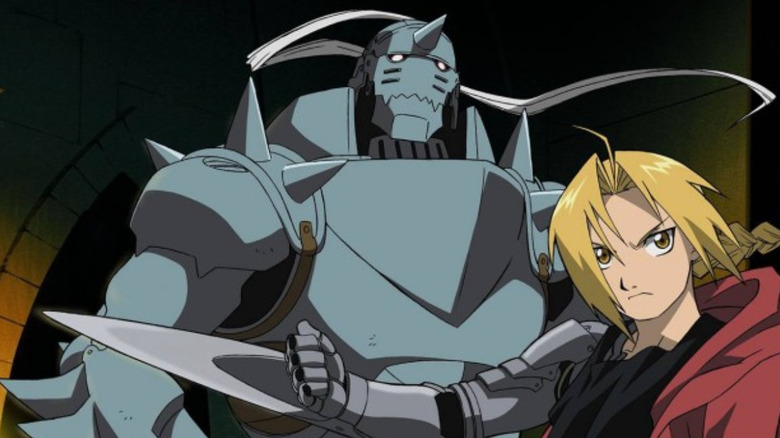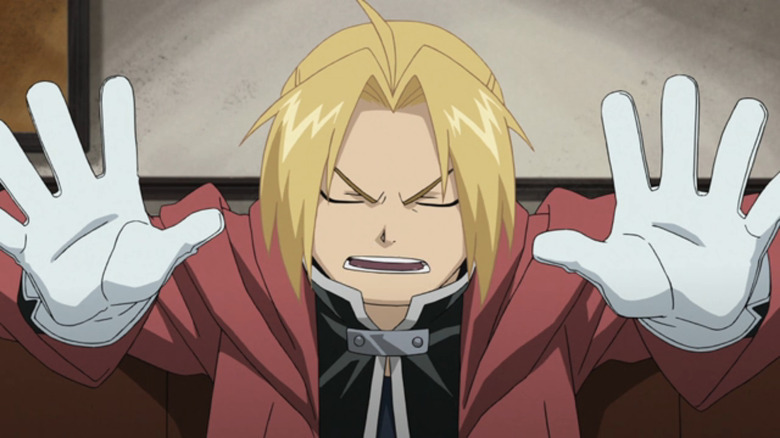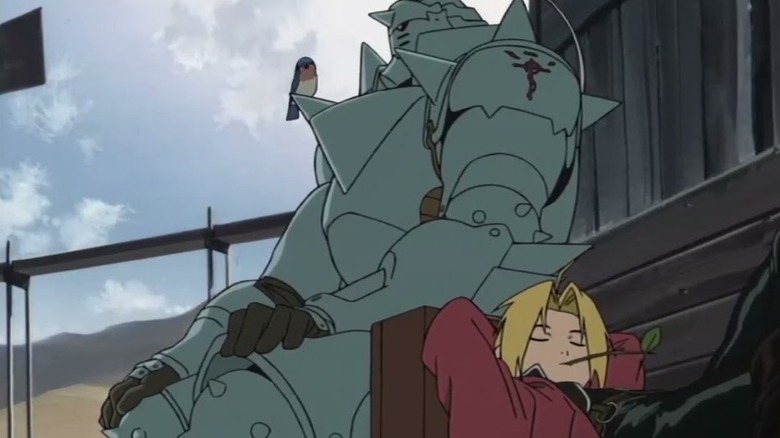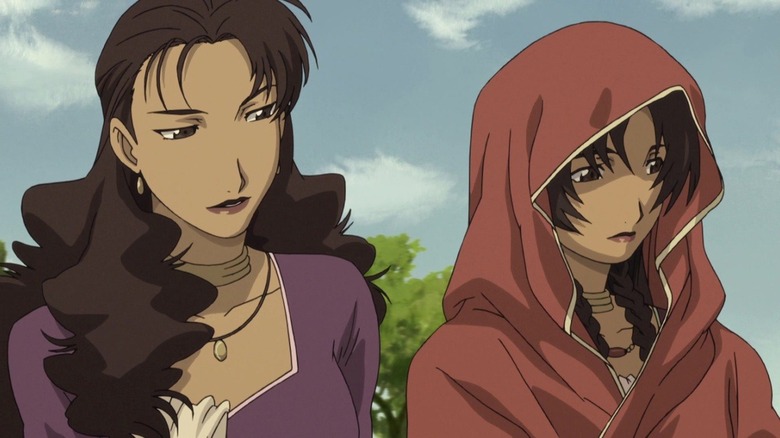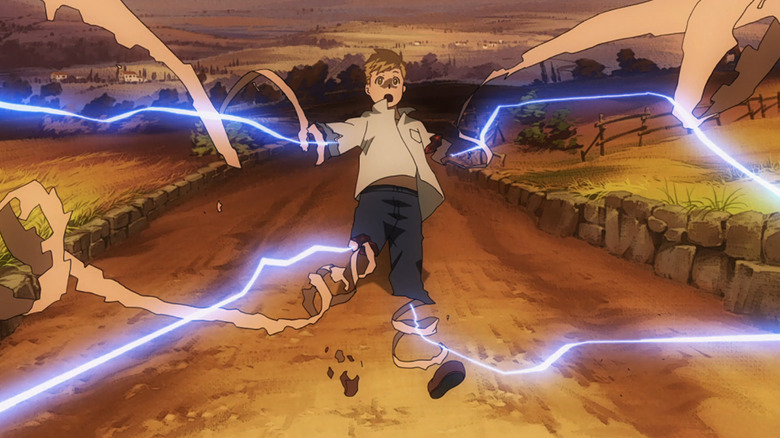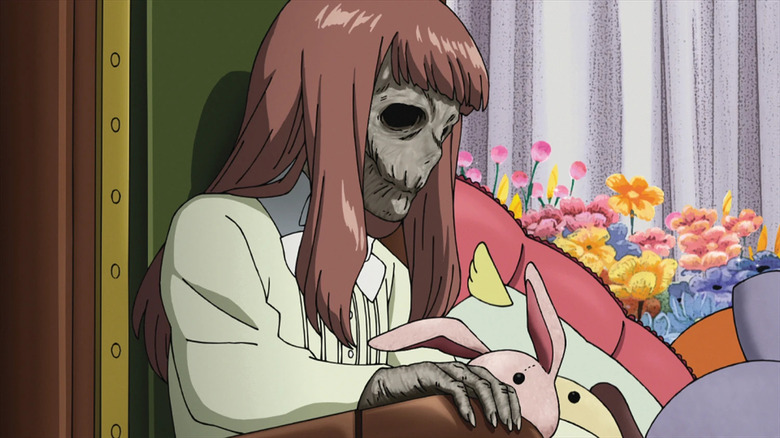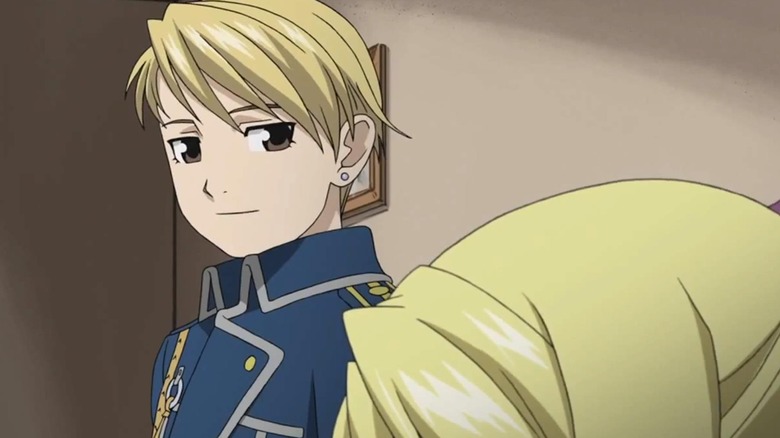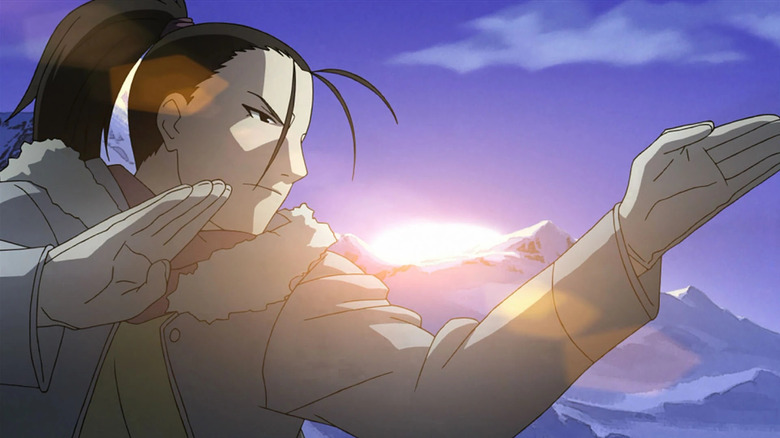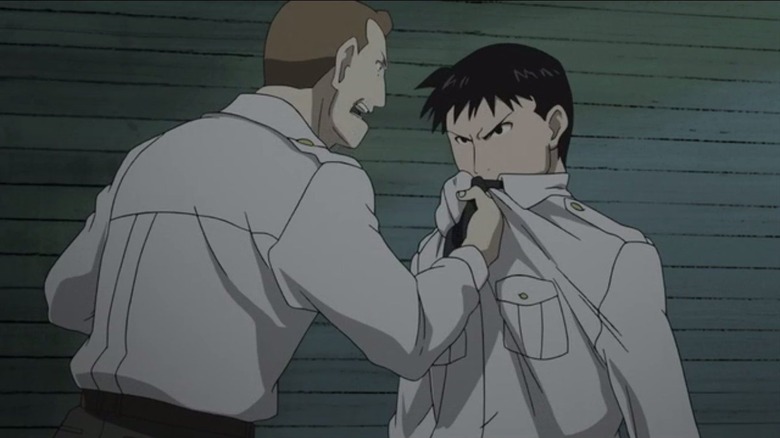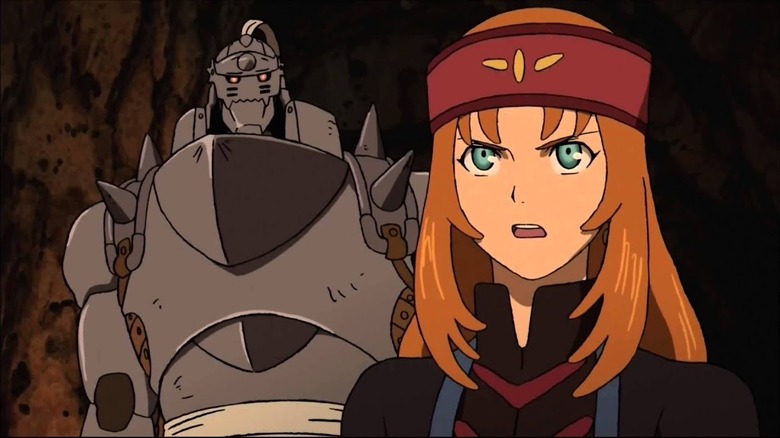The Correct Order In Which To Watch Fullmetal Alchemist
Starting as a feature in the legendary manga anthology "Monthly Shōnen Gangan" in 2001, Hiromu Arakawa's "Fullmetal Alchemist" has long since become a worldwide phenomenon. Serving as a gateway series for countless manga and anime fans across the globe over the last 20+ years, this media powerhouse continues to inspire more than a decade past the original story's ending in 2010. While nowhere near as lengthy as long-running Shōnen series like "One Piece" and "Naruto," "Fullmetal Alchemist" has still managed to introduce us to some of the most memorable characters in anime history via an incredibly lush world full of in-universe politics and intrigue, and that's all before you get to the top-notch action sequences and animation.
It might go without saying at this point that "Fullmetal Alchemist" is a must-watch for anyone who loves a great action-adventure story with a lot of heart that doesn't necessarily promise its viewers a "happily ever after" at the end. Yet, with so much "Fullmetal Alchemist" available, and much of it following disparate storylines, it's understandable for newcomers to feel a little confused as to where exactly they should begin. Some will say to skip the original anime and focus on the "Brotherhood" follow-up series, while others will note that the original anime is what kicked off the franchise for viewers worldwide and gave it the fame and notoriety it has today. As for us, we're taking it back to the beginning.
What you need to know before starting Fullmetal Alchemist
Though no two adaptations are alike, these stories all center around Edward and Alphonse Elric, two orphans that attempt to bring their recently deceased mother back from the grave through alchemy only for their plan to go horribly awry. This leads to Edward losing his arm and leg, which are replaced by automail, while Alphonse loses his body entirely. While Edward is able to tie Alphonse's soul to a large suit of armor to avoid losing him forever, their mutual goal is to find the magical Philosopher's Stone which will theoretically return their lives to "normal." Naturally, this is all more easily said than done, and Edward is convinced by Roy Mustang to become a state alchemist working for the government of this steampunk world.
The original series and the first animated film are a part of one continuity, while the "Brotherhood" series is generally considered a more faithful adaptation of the manga. At this point, "Fullmetal Alchemist" is easily one of the most recognizable franchises on the planet, and it has been adapted to just about any medium that you could hope for. Beyond the original manga, the anime adaptations, and the feature films, there is also a series of light novels, a card game, and video games, as well as other supplemental materials for the super fans to dive into. This is to say that even if you have read every issue and watched every episode of the series, there are still plenty of new elements out there to explore.
Fullmetal Alchemist (2003)
Kicking off in 2003, the original "Fullmetal Alchemist" series started when only a few volumes of what eventually became a 27-volume manga had been released. As such, the beginning more or less follows the comic, but because the show had fully run its course well before even the midway point of the manga, it diverges significantly from what we know today to be the conclusion of the series. For some fans, this series is to be skipped in favor of the "real" adaptation, but for our money, viewing the complex world of "FMA" as capable of sustaining multiple interpretations makes the whole viewing experience better overall.
Arakawa may not have been a major player in the day-to-day of creating the series, but she was still very much involved with approving scripts and mapping the general direction. "FMA" introduces the concept and the characters nicely and allows for more space to develop relationships by granting extra time for banter and hijinks. The slower pace and more dramatic vibe of the show places it in a different subcategory than "Brotherhood," focusing more on tension and character building than the action-packed 2009 series. Though they have different villains, different character emphases, and they each explore different philosophical themes, these are two shows that compliment rather than detract from one another, particularly when watched in sequence.
Conqueror of Shamballa (2005)
"FMA" wrapped its run at 51 episodes, and the show officially concludes in the feature film "Conqueror of Shamballa." While the final episode of "FMA" is famously derided for failing to reconcile the questions posed by the series in a satisfactory way, it is best when viewed as a necessarily uncertain conclusion to the increasingly morally gray world the brothers navigate starting with Episode 1. Feeling trapped in a cruel system while continuing to fight for the people he cares for is the last choice Edward is left with as he's forced to let go of some of his more naive and arrogant assertions.
Many of the textual injustices of the fictional world of "FMA" are mirrored by very real historical counterparts in "Conqueror of Shamballa" as Edward is separated from his brother, stripped of his mystical powers, and transported to 1923 Munich. The collision with post-WWI German politics and "FMA" isn't to everyone's tastes to say the least, but it keeps with the themes of the show, which regularly makes a point of displaying its characters experiencing displacement and other harsh social injustices while summoning the strength to keep moving. While the original ending is ethically ambiguous and leans into Dante as an antagonist, "Conqueror" brings Edward and Alphonse back together and shows them once again striving for the common good, even with WWII on the horizon. Which ending you prefer is up to you, but fortunately, this franchise gives us multiple choices.
Brotherhood (2009)
Beginning very close to the same time the manga series was completing its masterful run, "Fullmetal Alchemist: Brotherhood" is generally considered the definitive take on the series. Armed with a better working understanding of the direction of the main story, this update features an increase in quality on the already stellar animation of the original series, as well as a more organic pace and conclusion, told in roughly the same amount of time. While "FMA" may have the stronger beginning, "Brotherhood" has a level of intentionality that brings many of the sociopolitical themes of the story to the forefront through aspects such as the nation of Ishval and its civil war.
There's no denying that "Brotherhood" is wild from beginning to end, and you owe it to yourself to kick back and enjoy it in its entirety. Switching its primary antagonist from Dante to the somewhat more realized Father and filling in a lot more story around Alphonse and Edward's mysterious dad, this take benefits greatly from a more determined pace. As said, "FMA" spends a lot more time filling in character details, but this series is still no slouch as it fleshes out characters that had little screen time in the original like Riza and Tim Marcoh. The conclusion of "Brotherhood" is generally considered to be a bit smoother and certainly gentler than that of the first series, showing a different and in some ways more hopeful side to the story's central philosophies. This is one that seriously earns its reputation as one of the greatest complete anime series of all time.
Brotherhood Special: The Blind Alchemist (2009)
Approaching the conclusion and after the ending of "Brotherhood," a short series of supplemental OVAs aired, with "The Blind Alchemist" being the first of them. Taking a cue from the bonus chapters of the manga, this short series of extra stories makes for great viewing after you've made it through the complete "Brotherhood" story. This short in particular excels by taking the time to expand our understanding of alchemists outside of those we meet in the central story, although, even by "FMA" standards, it takes some surprisingly dark turns to get there.
When the brothers hear that someone has been successfully brought back from the dead through human transmutation, they are intrigued as to how this is even possible given what they know of alchemy. They meet Judou, who claims to have offered his eyes in order to bring a young girl back to life but refuses to detail the process he undertook in order to do so. Naturally, we ultimately discover that this process wasn't the success that Judou claims, although the story behind it is particularly disturbing. Using the secrets families keep behind closed doors as a larger commentary on the nature of death, this special nails many of the ongoing themes of "Brotherhood" while telling a tightly packed, emotionally fraught tale with no clear villains at all.
Brotherhood Special: Simple People (2009)
With the tighter pacing of "Brotherhood," the OVAs tend to be what might otherwise be described as "filler" episodes that include some extra plot details without being strictly essential for the larger story. Still, each of these stories gives us something we wouldn't have otherwise had, and nowhere is that truer than with the second special, "Simple People." As Edward keeps breaking his automail and needing replacements, he seeks out earrings to give to Winry as a peace offering. He even manages to break his automail in this episode, adding a bit of comedy to the relationship as we see how frustrating Edward's constant need of mending can be for Winry.
Yet, the true standout of this short is the dynamic between Winry and Hawkeye, as Winry explains that she began piercing her ears after seeing Hawkeye's earrings and admiring them. Hawkeye notes that she, likewise, grew her hair long when she first met Winry. Rebecca observes that these explanations are surprisingly simple, and Hawkeye concludes that the world is a simple place, with so little standing between life and death. A short, poignant little tale that is a bit on the lightweight side, "Simple People" nonetheless offers a sense of somber acceptance of the paradoxes we so often ignore in order to live our lives, which adds an underlying meaning to the title.
Brotherhood Special: The Tale of Teacher (2010)
While the majority of Izumi Curtis' role in "Fullmetal Alchemist" is told via flashbacks, there's no denying that she's one of the most important figures in the anime; her openness to others and willingness to work with the brothers Elric despite their rough edges makes her an indispensable mentor. Her experiences mirror Edward's in some ways, and she shares much of his mistrust in regard to military and systemic injustice, which allows her to connect with the boys on an emotional level. Backstory around her character doesn't come up all that often, which is why "The Tale of Teacher" is such an energizing episode.
Taking us back to Izumi's teen years, we see her determination in action as she travels in order to become the apprentice of the alchemist Silver Steiner. When she arrives, she's hardly given a warm welcome as Steiner gives her a single blade and tells her to come back after she's survived one month in the wilderness alone. As one might expect, this only ignites her desire to survive, although the twist shows that Steiner isn't all he's cracked up to be. This episode establishes more of Izumi's history in a charming flashback that shows she was always the stubborn, temperamental, but heartbreakingly kind woman we get to know in the main series.
Brotherhood Special: Yet Another Man's Battlefield (2010)
From the start, Roy Mustang plays a huge role in "Fullmetal Alchemist," but opportunities to look deep into his past rarely come around. We first meet him as a proud military officer that regularly denies his own emotions, choosing instead to prioritize his meteoric rise up the ranks of the State Alchemists. But over the duration of the series, we learn that there is a lot more to this guy than immediately meets the eye. Traveling back to his early days in a military boot camp, we see him make fast enemies of a group of bullies that target an Ishvalan recruit named Heathcliff.
Focusing on a fellow cadet named Hughes, the story entails Mustang and Hughes competing with one another until Mustang gets in a fight with the bullies only to be surprised that Hughes has his back. Though this brings this story's three primary characters — Hughes, Mustang, and Heathcliff — together, they are soon torn apart anew as war forces them to take different sides. What might have been a simple story about finding friends in unexpected places, this short continues the theme of these OVAs by telling us something about Roy that we never knew while doubling down on the questioning nature of the series.
The Sacred Star of Milos (2011)
The final entry in the animated section of the "Fullmetal Alchemist" franchise to date is 2011's "The Sacred Star of Milos," the second feature film in the "FMA" universe, which picks up after the conclusion of "Brotherhood." Despite hitting theaters after the series' end, the story is set during the "Brotherhood" timeline. We're guessing it occurs somewhere between episodes 15 and 24, though it is often considered non-canonical by fans due to some general continuity inconsistencies. Successfully avoiding the possibility of being viewed as simply a longer OVA by switching the focus onto new characters and amping up the action sequences, "Milos" isn't strictly necessary viewing, but it's a lot of fun, and a great way to end your "Fullmetal Alchemist" binge.
While Al and Ed are tied up attempting to capture an escaped convict, a new character called Julia Crichton takes the lead. Discovering her parents' bodies after a particularly gruesome dream of their deaths as a child, she becomes a major political figure as she's held for an immigration violation that places her in the center of many differing ideological viewpoints. Naturally, the brothers are able to work together to help prevent escalation to war, but the story isn't without its own plot twists. The film overall works as a nice nightcap for an iconic run of episodes, luxuriating in its over-the-top fight scenes and the space to play around facilitated by its change in focus.
